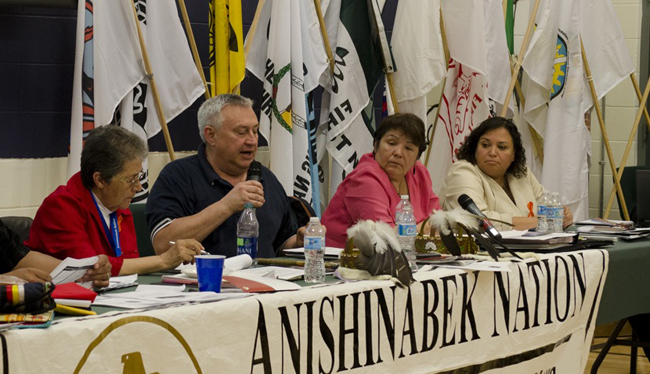Anishinabek unanimous: Move ahead on education

By Kelly Crawford
MUNSEE-DELAWARE FN – The Anishinabek Nation has moved a big step closer to First Nations control of First Nations education.
Chiefs-in-assembly unanimously endorsed a resolution to support the updated Anishinabek Education System strategic plan, launching the process in spite of drawn-out fiscal negotiations with the federal government.
“We want to be ready. This is about our children,” said Grand Chief Patrick Madahbee.
The Annual General Assembly heard presentations from Restoration of Jurisdiction (ROJ) Director Mike Restoule and education negotiator Tracey O’Donnell about the six-year wait to receive a fiscal proposal from Canada to fund the Anishinabek Education System.
“The Minister (new INAC Minister Bernard Valcourt) seemed surprised when we pointed out the offer’s shortcomings.”
The approved strategic plan will explore opportunities to advance the Models Schools Program with the Martin Aboriginal Education Initiative, and the possibility of developing a Master Education Agreement with Ontario. In May, Anishinabek negotiators submitted a response to Canada, which includes provisions for Anishinabek First Nation allocation and control over special education funding.
Once additional funding is secured, a coordinator will be hired for the Kinomaadswin Education Body (KEB) Board of Directors to implement the strategic plan.
Nipissing First Nation Chief Marianna Couchie, an award-winning educator who has been working with the ROJ education process, moved the resolution to update the strategic education plan.
“Before becoming chief, I spent over 30 years in education,” she told delegates. “Back in June 2012, I had to speak against it as it didn’t make sense regarding fiscal or curriculum. We have proposed a different model, a decentralized model.”
The improved plan will include the development and implementation of a Comprehensive Communications Plan to ensure First Nations citizens are fully informed about KEB implications for their communities. Community leaders and educators will be kept up to date on the status of the strategic plan through regular written and Internet reporting, meetings of the five Regional Education Councils and an annual education symposium.
All decisions on agreements regarding education funding or education programs and services
will be made by First Nations. No agreements will be signed or changes made to the existing education arrangements to deliver First Nation education programs and services without the formal and direct approval of each First Nation.
“It is something that can be tweaked after negotiations are complete,” said Alderville FN Chief James Marsden, Leadership Council portfolio holder for education. “This is a basis for our shared responsibilities.”
Concerns were raised regarding the development of a First Nations Schools Network for communities with on-reserve schools. The resolution passed unanimously after it was pointed out that the First Nations Schools networking opportunities were included in the strategic plan.
Grand Council also approved a resolution endorsing the selection process for the board of directors of the Kinomaadswin Education Body.


